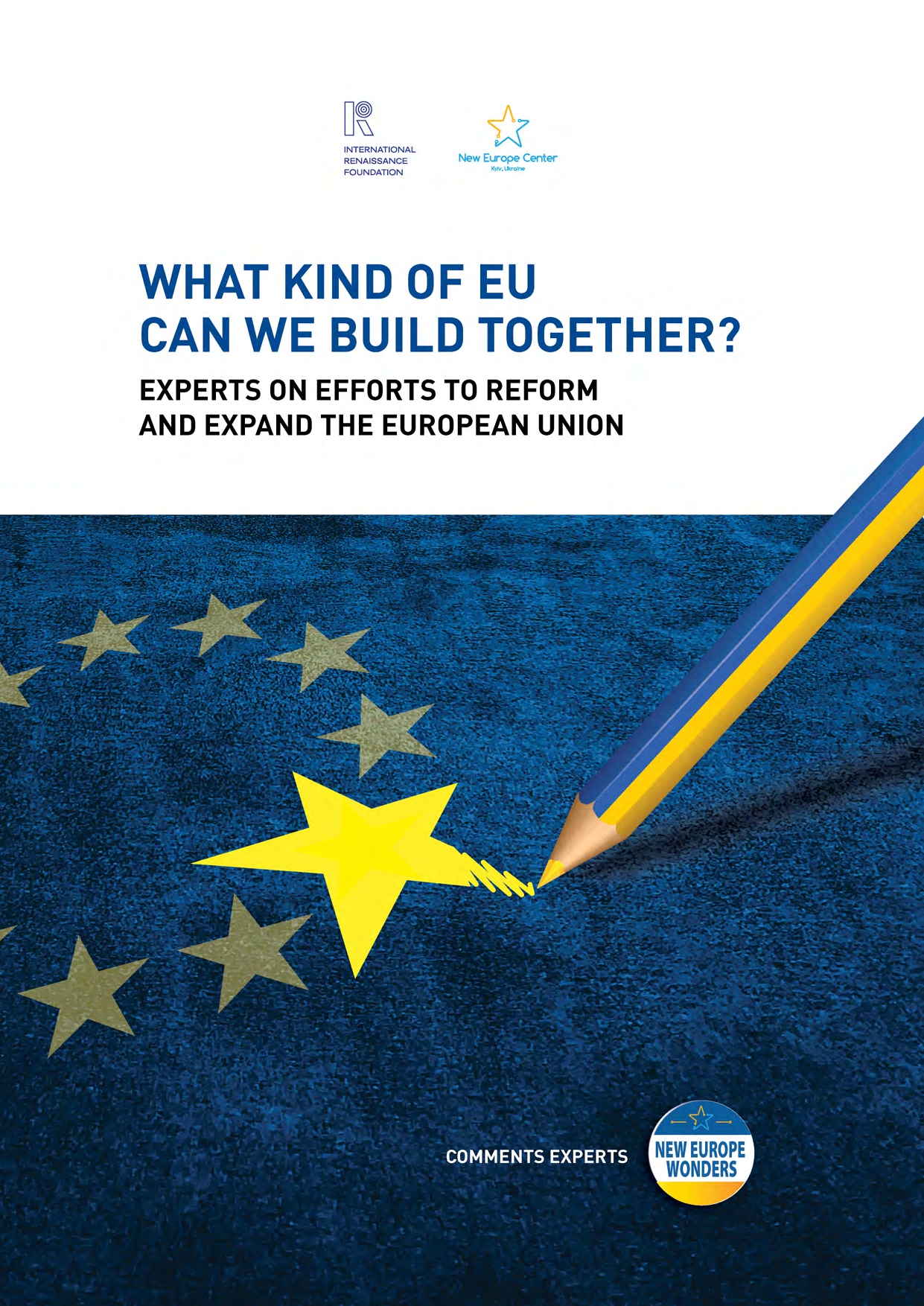
How can the European Union be reformed, considering the interests of future members, and what kind of EU can we build together? This is the question that the New Europe Center asked several experts to address for the New Europe Wonders rubric. *
The EU enlargement is again a strategic imperative after a long break. The Russian aggression against Ukraine not only revived the debate about the enlargement but also created a sense of urgency about the reform of the EU. Although the two, the enlargement and the reform of the EU, are formally not related, the future enlargement must take place in a reformed EU fit to accommodate new members. Therefore, both processes have to take place simultaneously. The enlargement should not be viewed as a problem, even if the incoming countries are poorer and not as ready for the EU as many would expect. On the contrary, the enlargement is helping the EU to pursue a more ambitious reform schedule. The areas to be covered by the reform should include, above all, the decision-making process that should not allow paralyzing the EU with one veto but resort to a qualified majority in areas of foreign policy and security. Also, the issues of redistribution of votes in the EU, the non-reform of the common agricultural policy, and other pressing issues could create a disbalance in the EU once the new members join.
* The expert comments were gathered from the end of November 2023 to the end of December 2023.
Lykke Friis, Director of Think Tank EUROPA and Co-chair of European Council on Foreign Relations (ECFR), Denmark
The December European Council meeting has already entered the history books. The decision to open accession negotiations with Ukraine and Moldova was indeed historic. But the path to membership will be long and winded. Most of the hard work has to be shouldered by the candidate countries. It is one thing to master the criteria for opening negotiations; quite another to successfully conclude them.
However, the EU also faces a herculean task to make sure that EU’s institutions and policies remain effective with potentially up to 36 countries. This is strongly in the interest of Ukraine and the other new member states. After all, what is the point of joining a dysfunctional European Union? In short: Making EU institutions and policies “enlargement ready” is an essential part of the journey towards membership, not a detour. Nevertheless, internal reform could delay the process. Just imagine the difficulties of agreeing on increasing qualified majority voting in the Council or the size of the Commission.
From this perspective another crucial aspect of the December European Council is the decision to finalise a roadmap for internal reform by the summer of 2024. Such a roadmap should result in a clear strategic plan, just like in the run up to the “big bang” enlargement of 2004. In the so-called Agenda 2000 member states paved the way for enlargement by revising various policies such as the common agricultural policy. Similarly, member states should agree on a clear timetable for an “Agenda 2030” at the European Council in June. Otherwise, the EU risks not being ready when the candidate countries fulfill all the necessary conditions. Of special importance is the budget. To enable new member states to join before 2034, the EU will have to make room for the countries in its next multiannual framework, which runs from 2028-2034. In practice this implies that the Agenda 2030 should be part of the 2024 European Parliament election campaign and agreed upon during the Polish or Danish EU Presidencies no later than December 2025.
The link to the European Parliament election is crucial. After all, opinion polls such as those conducted by the European Council on Foreign Relations (ECFR) show that public support among current member states is probably the biggest Achilles heel for enlargement. Many voters remain undecided and a significant portion of Europeans is worried that enlargement may have adverse effects on the EU’s economy and security. Hence, we should draw another lesson from the “big bang enlargement” round: if Heads of State and Government take public support for granted, the EU could experience a similar rude awaking as it did in 2005 when France and the Netherlands rejected the constitutional treaty, not least out of fear of free movement of workers from the new member states. The EU’s response to the “double no” in 2005 was the so-called plan D – D for dialogue with civic society. In order to avoid this, member states should start with the dialogue this time.
Nathalie Tocci, Director of the Istituto Affari Internazionali, Italy
Russia’s invasion of Ukraine has reversed the reform-enlargement nexus. After the eastern enlargement two decades ago, the EU progressively lost interest in enlargement. Enlargement was viewed as a political, social and economic cost, while the strategic benefits were unclear. After all, three of the six Western Balkan countries are NATO members and Turkey is too. EU enlargement would only bring marginal security benefits. As EU member states and, consequently, candidate countries lost interest in enlargement, reform both of the candidates and of the EU (aka absorption capacity) became the reason (and excuse) why enlargement languished. In order to enlarge, reforms first had to take place, and given they didn’t, enlargement had to wait. Put bluntly, reform was discussed to avoid enlarging. The war has reversed the nexus.
Enlargement has become a strategic imperative again, and the fact that NATO enlargement (to Ukraine and Georgia) is more uncertain has entrusted EU enlargement with a security edge. This has given the reform debate a more urgent and practical meaning: given that enlargement must happen, what reforms are necessary? It boils down to identifying the institutional, decision-making and policy (including budgetary) changes that must take place, even if at a bare minimum. However, a more urgent and practical reform conversation need not be unambitious. Especially with Poland returning to the European fold, a more ambitious reformenlargement agenda may in fact be one of the main features of the next EU political institutional cycle.
Vessela Tcherneva, Deputy Director, European Council on Foreign Relations (ECFR) and head of ECFR’s Sofia office, Bulgaria
There is a widespread agreement that EU enlargement would enhance the bloc’s influence in its immediate vicinity and enable it to function as a geopolitical player. But ECFR’s research indicates that the discussion on how and when to proceed with enlargement has barely commenced in EU member states. National positions on budgetary matters, institutional reforms, and enlargement methodologies have yet to be fully developed. There is a broad consensus among national governments against a big bang enlargement, similar to the one in 2004, and in favour of a meritbased approach for all member states. However, there are differing ideas among countries regarding which candidates should be prioritized for accession. Some countries are more focused on the accession of Western Balkan countries, while others are more dedicated to the membership of Ukraine and Moldova.
Many member states are not prepared to lose the power they already have by giving up their veto power. The QMV conundrum highlights the risks that institutional reform poses for the enlargement process. The countries most supportive of enlargement are also the most fearful of the debate on EU reform.
On the more practical side, the future of the EU’s budget and cohesion are key concerns for member states regarding enlargement. Without an increase in the EU’s budget, it will be difficult to cover rising costs, and cuts may be necessary to existing programs such as cohesion funds and the Common Agricultural Policy (CAP). Bilateral disputes between candidate countries and between them and some member states also pose obstacles to the enlargement process.
Illiberal populism is a significant political threat to enlargement. The recent Polish election, which weakened the “sovereigntist” camp in the EU, provides some hope that illiberalism can be rolled back and that EU mechanisms, such as infringement procedures and verdicts by the European Court of Justice, play a role in containing it while it is still in power.
Teun Janssen, Academy Fellow, Clingendael Institute, The Netherlands
Our European project is about stepping away from the known, past abys by jumping into an unknown, future imagination. In 1992, the European Union was founded in my birthplace Maastricht to make Europe whole and free. It is easy to forget in hindsight how unlikely this had seemed months before. It was the mass mobilization of Eastern Europeans themselves which ultimately made 1992 come about, because it made Western Europeans re-imagine them as fellow Europeans. Enlargement was made unavoidable, but it was never inevitable.
Europeans can again re-imagine. Yes, the EU must radically reform its institutions, decision making and financial architecture to make it ready for enlargement in a world where (we finally realise …) size and weight matter. This train has left the station, but still has to pick up passengers. In 2016, my country voted against an EU association agreement for Ukraine. In 2005, the Dutch voted down a European Constitution. On 22 November 2023, a far-right Eurosceptic with an ambiguous position on Russia won a quarter of the seats in Parliament. People, not governments, will finally decide on Ukraine’s EU accession.
The fundamental challenge ahead is to convince our publics that a union of 30+ is a union of, by and for them.
One where Ukraine isn’t an external threat to ‘’our farmers’’ but a shared granary and power station at the heart of our green transition. Ukrainians have demonstrated incredible awareness, creativity and energy in tailored strategic communication before, including in my country. It worked precisely because it was spontaneous, grassroots and inclusive. The spirit of Maidan can revolutionise the EU’s imagined community. None of this is inevitable, but we can choose to make it unavoidable.
Dr. Kristi Raik, Director, Estonian Foreign Policy Institute, Estonia
The accession of Ukraine and other candidate countries entails a great potential to strengthen the EU. However, just like during the previous eastern enlargement, a lot of the debate in European capitals is focused on concerns and fears. The two main concerns are that the EU’s decision-making will be paralyzed and that the budgetary impact of accepting new, relatively poor member states will be unbearable. Hence the argument made by some actors such as the European Parliament that radical reforms of the EU are required as a precondition for enlargement. Yet, as President of the European Commission Ursula von der Leyen has made clear, the EU can be made fit for enlargement without treaty change. There will be institutional matters to be solved, such as the number and distribution of seats in the European Parliament and the way to organize the work of the Commission with 30+ member states. There will be adjustments and transitional periods to be made to the EU’s budget, which are manageable. The most important challenge for the EU is to strengthen a common strategic understanding among current and future members about how the EU can be a relevant player in the world of great power competition and take greater responsibility for European security. Ukraine will have a lot to contribute in this regard.
Pierre Haroche, Lecturer in International Relations and International Security at Queen Mary University of London, France
First, the European Union must reform itself to help the candidate countries to join safely. In other words, to make room for enlargement, Russia must be pushed back.
The priority for the Union is to adopt a financial instrument capable of supporting a massive collective industrial effort to supply Ukraine with arms and ammunition. In addition, following a logic of gradual accession, Ukraine should be immediately integrated into the defence dimension of the internal market without waiting for full membership. This would enable the European Commission to support the Ukrainian defence industry.
Second, from an institutional point of view, the Union will have to reduce the scope of the unanimity rule in the area of foreign and security policy. The next enlargement will be geopolitical in nature. It will be carried out against Russia. It will therefore fully transform the EU into a geopolitical union. A geopolitical union cannot afford to remain vulnerable to the veto of one disloyal member. To reassure reluctant governments, a special qualified majority could be established in foreign and security policy, in which only three member states could form a blocking minority.
Forming a solid geopolitical union should be the shared ambition of old and new members alike.
Jakub Jakobowski, Deputy Director, Center for Eastern Studies, Poland
The next round of EU enlargement – both towards Eastern Europe and the Balkans – would indeed constitute a systemic change to the European Union and a great historic impetus to advance the European project. Out of all prospective member states, Ukraine carries the biggest economic and geopolitical weight – and needs to make sure that this will translate into a type of membership that can help it achieve security and prosperity.
First of all, the mutual relationship between the reform and enlargement should be set straight otherwise, an intra-EU reform stalemate can derail the accession. While those two processes will meet at some point – hopefully by 2030 – they should be decoupled in the procedural sense: Accession negotiations themselves should be clear and merit-based and not dependent on the progress in the EU ref orm debate. Secondly, the Council voting algorithm matters, especially in light of the Qualified Majority Voting system. Central and Eastern European member states – with a shared set of economic development and security interests, and particularly after Western Europe’s failure to deter Russia
Leo Litra, Senior Research Fellow, New Europe Center, Ukraine
The EU reform is long overdue and has been looming for the last few years as we witnessed deadlocks on so many occasions inside the EU. For Ukraine, the increasing cases of bilateralisation of enlargement and thus blocking the accession process for several countries based on bilateral grievances is alarming. There is a sort of common sense already that the EU reform shall take place simultaneously with the accession process. However, there should be no strict conditionality that the accession of new countries is possible only if the EU reform is finalized. As history shows EU’s perpetuum mobile is a never-ending reform and there is no such thing as finalite europeenne.
Ideally, the institutional reform of the EU should take place before the enlargement and ensure a balance along the two lines: big vs small states and new vs old states but with no compromise on the supremacy of rule of law as the main principle of the European Union. Alongside this, the core EU elements such as the common agriculture policy will need a twist to fit new members and avoid internal trade wars, which have been often taking place in recent years. For Ukraine, it is also important that the enlargement methodology is improved. The best would be if individual members are not given veto power on every step on the accession path. Instead, blocking of the process shall take place only if the European Commission recommends it or one-third of the member states insist on it.
PDF-version is aviable here.
The material prepared with the support of the International Renaissance Foundation. The material reflects the position of the authors and does not necessarily coincide with the position of the International Renaissance Foundation.













